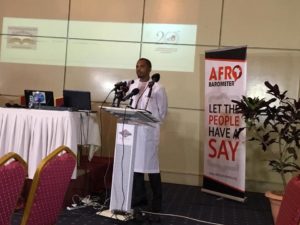Half of Gambians perceive decrease in corruption over the past year

Almost half of Gambians say the level of corruption in the country has decreased in the past 12 months, Afrobarometer’s maiden national survey in the Gambia shows.
A majority of citizens say that ordinary people can make a difference in fighting corruption and that they can report corruption incidents without fear. The government gets good marks for its performance in fighting corruption, and a majority of citizens believe authorities are likely to take action when incidents of corruption are reported.
The study also shows that the police and business executives are perceived to be the most corrupt officials while religious leaders, members of Parliament, and traditional leaders are observed to be the least corrupt. Religious leaders, traditional leaders, and the president are the most trusted institutions, while opposition political parties are the least trusted.
The Gambia ranks 130th out of 180 countries in Transparency International’s 2017 Corruption Perceptions Index, an improvement from 145th in 2016.
Afrobarometer survey
Afrobarometer is a pan-African, non-partisan research network that conducts public attitude surveys on democracy, governance, economic conditions, and related issues in Africa. Six rounds of surveys were conducted in up to 37 Africans countries between 1999 and 2015, and Round 7 survey results are currently being released. Afrobarometer conducts face-to-face interviews in the language of the respondent’s choice with nationally representative samples.
The Afrobarometer team in the Gambia, led by the Centre for Policy, Research and Strategic Studies (CepRass), interviewed 1,200 adult Gambians in July and August 2018. A sample of this size yields country-level results with a margin of error of +/-3 percentage points at a 95% confidence level.
Key findings
- Almost half of Gambians (46%) perceive a decrease in corruption over the past year, but one-third (32%) say the level of corruption in the country has increased (Figure 1).
- More than half (54%) of Gambians say the government is doing “fairly well” or “very well” in fighting corruption (Figure 2).
- Two-thirds (66%) think ordinary citizens can make a difference in fighting corruption, and six in 10 (58%) say they can report corrupt incidents without fear of retaliation (Figure 3).
- A majority (55%) say it is “somewhat likely” or “very likely” that authorities will take action when incidents of corruption are reported (Figure 4).
- Police and business executives are perceived to be the most corrupt officials; 38% and 31%, respectively, say “all” or “ most” of them are corrupt (Figure 5). Officials perceived to be least corrupt are religious leaders (11%), members of Parliament (15%), and traditional leaders (15%).
- Religious leaders, traditional leaders, and the president are the most trusted leaders. They are trusted “a lot” or “somewhat” by 85%, 71%, and 67% of respondents, respectively.


Comments are closed.